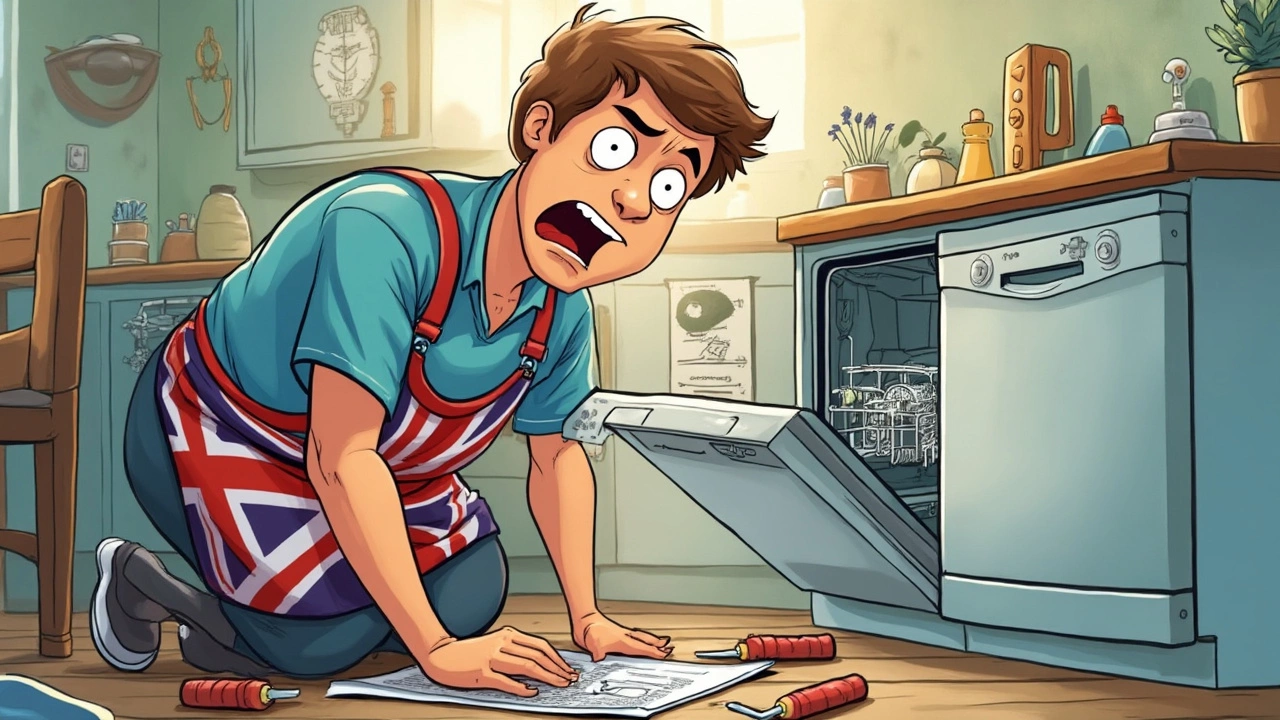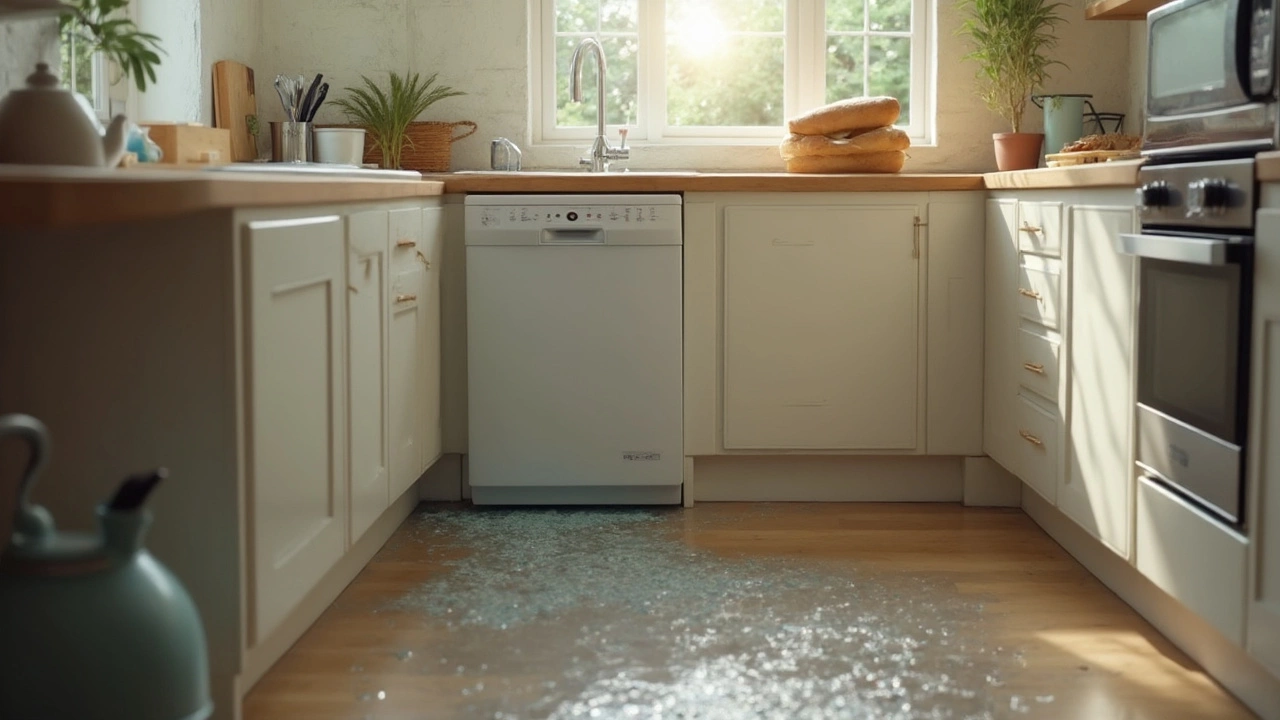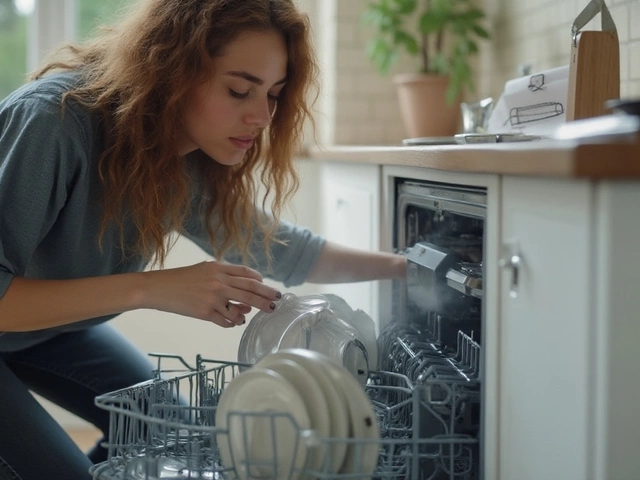Been opening your dishwasher only to find dirty dishes staring back at you? You're not alone. One of the most common dishwasher faults is lousy drain performance, leading to not-so-sparkling results. But why does this happen and what can you do about it?
Usually, it's not about a major breakdown. Tiny bits of food and debris can end up clogging filters or blocking the spray arms. Sometimes, the drain hose is kinked or the air gap is blocked. Cleaning these regularly can make a world of difference.
Start with a peek at the spray arms. They should rotate freely and the little holes must be clear. These parts are easy to clean with a brush or a toothpick. Then, take a look at the filters—they're the gateway to a clean wash. Give them a good rinse. Didn't fix the problem? It might be time to check the drain hose for any kinks or clogs.
- Most Common Dishwasher Issues
- DIY Fixes and Quick Troubleshooting
- When to Call a Professional
- Preventive Tips for Long-Lasting Performance
Most Common Dishwasher Issues
Dishwashers, those trusty kitchen sidekicks, can sometimes throw a wrench in our plans. But which issues pop up the most often? Understanding these can save you time and money on dishwasher repair.
Water Not Draining
Probably the biggest headache for a lot of folks. Typically caused by clogged filters, blocked drains, or a kinked hose. Quick fix? Clean the filters and check the hose for any bends that might be messing with the flow.
"A blocked air gap or hose is often the culprit behind a dishwasher that doesn't drain correctly," says appliance expert Susan McAdams from Home Appliance Solutions.
Not Cleaning Dishes Properly
You run the machine, but your plates still have yesterday's dinner on them. Frustrating, right? This can happen if the spray arms are clogged. Ensuring they're free of debris and can spin freely is essential for a clean wash.
Strange Odors
If your dishwasher smells off, lingering food particles could be the reason. Regular cleaning helps, but you might also need a specialized cleaner occasionally to tackle stubborn smells.
Leaking Water
Leaking could soak your kitchen and your mood. Check the door gasket first. It's that rubber seal that keeps water where it should be. If it's faulty, replacing it is often the best solution.
| Issue | Percentage of Occurrence |
|---|---|
| Water Not Draining | 30% |
| Poor Cleaning Performance | 25% |
| Strange Odors | 20% |
| Leaking Water | 15% |
These common dishwasher problems can usually be fixed by rolling up your sleeves for some DIY action. But don’t shy away from calling a pro if things get too tricky. Remember, a happy dishwasher equals a happy kitchen.
DIY Fixes and Quick Troubleshooting
So, your dishwasher isn’t cleaning right? Before calling in the cavalry, let’s see what you can clear up by yourself. You don't need to be an expert. Just a bit of curiosity and a few basic tools can do wonders.
Check the Spray Arms
First, give those spinning spray arms a look. Make sure they spin freely without hitting anything. Sometimes, they get clogged with gunk or hard water deposits. Grab a toothpick or a small brush and clean out the holes. That way, water can spray out freely.
Inspect the Filter
Next up, the filter. It's where all those food chunks land. Find it at the bottom of your dishwasher, give it a twist, and pull it out. Rinse it under hot water and scrub off any debris. This can often solve cleaning and drainage issues.
Check the Drain Hose
If draining is poor, peek at the drain hose. Make sure it's not kinked or blocked. It should have a smooth path to the drain. Disconnect it gently and rinse with hot water if needed. Sometimes, a wet vac can help suck out stubborn blockages.
Run a Cleaning Cycle
Still having trouble? Try a cleaning cycle with a bowl of vinegar on the top rack or a grocery store cleaner. It's simple, but it dissolves build-up and freshens things up. Set your dishwasher to run on the hottest setting and let it work its magic.
| Quick Troubleshooting Stats | Success Rate |
|---|---|
| Cleaning Spray Arms | 75% |
| Filter Rinse | 60% |
| Drain Hose Check | 50% |
These fixes won't cost you anything but a few minutes and can solve most common dishwasher problems. Plus, they help you learn more about your machine.

When to Call a Professional
Sometimes, no matter how many YouTube videos you watch or how many DIY attempts you make, the dishwasher just won’t cooperate. But how do you know when it's time to call in the pros? Here’s the scoop.
Persistent Drainage Problems
If water continues pooling in the bottom even after you’ve cleaned the filters and checked the hose, you might have a more complex issue. The pump or the drain valve could be malfunctioning, which isn’t something you should tackle without the right tools and expertise.
Unusual Noises
Is your dishwasher sounding more like a rock band than a home appliance? While some noise is normal, loud thuds or grinding sounds usually mean something is not right. Parts may be loose or worn out and need a professional's inspection.
Leakages
Found a mini flood in your kitchen? Leaks are a clear signal for professional help. They can stem from faulty door seals, a bad pump, or even plumbing mishaps. Ignoring it can lead to costly water damage, so it’s best to get it sorted quickly.
Error Codes
Modern dishwashers flash error codes when they're unhappy. While some codes are straightforward, others require a manual or expert to decipher. If your dishwasher keeps showing an error code and the manual isn’t helping, it's time to call the repair service.
Electrical Issues
If your dishwasher refuses to power on, or if it trips the circuit breaker, play it safe. Electrical problems are tricky and pose significant risks. A professional can diagnose whatever’s preventing your dishwasher from operating safely.
Basically, if you're scratching your head and nothing seems to improve the dishwasher's performance, that’s your cue. A professional will not only solve the immediate problem but also catch any other issues before they become major headaches.
Preventive Tips for Long-Lasting Performance
Want your dishwasher to purr like a kitten instead of clunk like a noisy old engine? Regular care is the key. Believe it or not, a little love can ensure your dishwasher performs at peak efficiency for years.
Keep Things Squeaky Clean
First up, get in the habit of cleaning the filter. Just like you wouldn't let your garbage bin overflow, don't let food debris hang around. Check and rinse your filter weekly to avoid troublesome blockages and keep those dishes coming out clean.
Get the Right Detergent
Using the correct detergent and in the right amount isn't just a suggestion—it's a rule. Not all detergents are created equal, so follow the manufacturer's instructions. Overloading soap can create too many suds, which might affect drainage, causing more dishwasher faults down the line.
Don't Clog the Spray Arms
Keep those spray arms clear because, trust me, they're crucial for a proper cleanse. Food scraps and other debris love to hide in these parts. Regularly pop them off and rinse them out.
Go Easy on the Loads
Remember your dishwasher's load capacity. Overloading means dishes will hug each other, blocking water paths and giving you half-cleaned plates. Stick to recommended filling levels and spacing for a more efficient wash.
| Frequency | Task |
|---|---|
| Weekly | Clean filter |
| Monthly | Inspect spray arms |
| Annually | Check hoses for wear |
By following these tips, you're setting yourself up for dishwasher success. Consistent maintenance can save you from many dishwasher repair bills and ensure your machine runs smoothly for the long haul.




